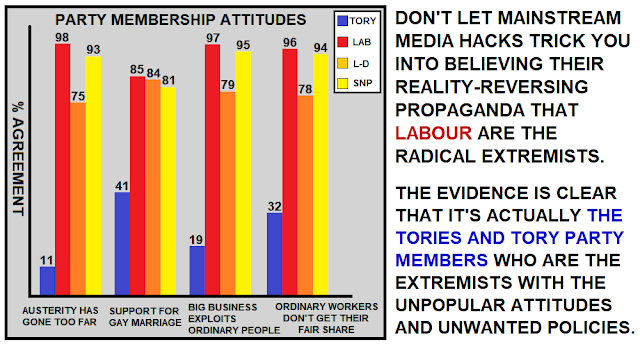Ever since Jeremy Corbyn was elected as Labour Party leader in 2015 the mainstream media have worked tirelessly to create the narrative that Corbyn and Labour are scary political extremists, while the Tories are safe and sensible political moderates.
The problem of course is that this near constant mainstream media trope is a complete reversal of reality.
When it comes to party policy it's Labour who promote policies with lots of public support like reversing the ongoing Tory privatisation of the NHS (84%), renationalisation of the railways (60%) and Royal Mail (65%), and public ownership of the water companies (59%). Meanwhile it's the Tories that have been enacting radical hard-right policies with practically no public support like the mass privatisation of state schools (6%), privatisation of police services (3%), and privatisation of NHS services and facilities (10%). [source for percentages]
When it comes to other Labour policies like free university education, running the National Grid as a not for profit public service, and the establishment of a National Investment Bank, these are not radical or extreme policies at all, in fact they're actually commonplace across the developed world.
When it comes to party policies it's clear that Labour have some very popular ideas that are considered completely normal across the rest of the developed world, while it's the Tories who are intent on pushing a radical and extreme political agenda that has very little public support.
Aside from the mainstream media campaign to smear the Labour leadership and Labour policies as scary and extreme, there's also a concerted and ongoing effort to portray ordinary Labour Party members as a bunch of dangerously radical nutters with extreme ideas that are miles away from the political centre ground.
The problem of course is that this is another deliberate reality reversal by the mainstream media.
An in-depth survey of political party members by Queen Mary University and YouGov has demonstrated beyond doubt that Labour Party members largely share the same political territory as the Lib-Dems and the SNP, while it's Tory party members who hold the radical and extreme beliefs.
When it comes to attitudes on immigration Labour, Lib-Dem and SNP voters are clustered extremely closely together on the belief that immigration enriches British cultural life, while Tory members are the radical outliers who believe that immigration undermines Britain's cultural life.
When it comes to representation in parliament a clear majority of all of the other party members wanted to see more parliamentary representation for women, disabled people, the working class, ethnic minorities, young people, and the LGBT community.
Tory members were the only group where the majority don't want to see more parliamentary representation for women, disabled people, the working class, ethnic minorities, young people, and the LGBT community.
Presumably they don't want increased political representation for any of these groups because they're perfectly happy to be ruled over by an over-privileged elitist clique in which wealthy, white, able-bodied, older males are massively over-represented, and every other demographic is significantly under-represented.
When it comes to austerity dogma, Labour Party members have broadly similar views to the SNP and Lib-Dems that austerity has gone too far, while Tory party members are the fanatical extremists who still overwhelmingly support the demonstrably ruinous economic vandalism their beloved party has been inflicting on the nation for almost 8 years. Presumably they cling to their belief because to admit that it's been a failure now would be to admit their own role in damaging British society and the British economy, so it's easier for them to maintain their delusion than to just admit their mistake.
When it comes to a whole range of other subjects, from a second EU referendum once the actual terms of the deal are clear, through forcing school children to uncritically obey authority, to reintroduction of the death penalty, Labour members align closely with the views of SNP and Lib-Dem members, while it's the Tory members who hold the radical and extreme positions.
Whichever way we look at the situation, it's clear that the Tory party are actually the dangerous radicals.
Theresa May is a weak and directionless leader who threw away her majority and put herself at the mercy of some of the most extreme elements in British politics (the headbanger Tory hard-right, the ultra-nationalist blue-kip demographic who abandoned UKIP to prop up Theresa May's Tories, the DUP who she had to bribe into supporting her government, and the fanatically right-wing propaganda merchants like Rupert Murdoch, Paul Dacre, and the Barclay Brothers).
The Tory party have spent the last seven years imposing one radically right-wing and spectacularly unpopular policy after another. From trashing our local services to lavish huge tax breaks to corporations and the mega-rich, through their systematic abuse of sick and disabled people, to spectacularly unpopular privatisation scams. They're demonstrably a bunch of extremists with practically no regard for what the public actually want.
Then there's the actual Tory party members. What else can we say about this bunch of regressive, xenophobic, hard-right, anti-worker, elitist, homophobic, austerity-fetishists? Is it really any wonder the Tory party is so full of horrific politicians pushing grotesque policies given the absolute state of the Tory party membership?
So next time you see the mainstream media trying to portray Jeremy Corbyn and the Labour Party as the scary political extremists, just remember that they're deliberately reversing reality to confuse you, and that it's the Tories who rely on the bunch of regressive political deviants in the Tory party membership to help push their radically right-wing and highly unpopular policies.
Another Angry Voice is a "Pay As You Feel" website. You can have access to all of my work for free, or you can choose to make a small donation to help me keep writing. The choice is entirely yours.






No comments:
Post a Comment